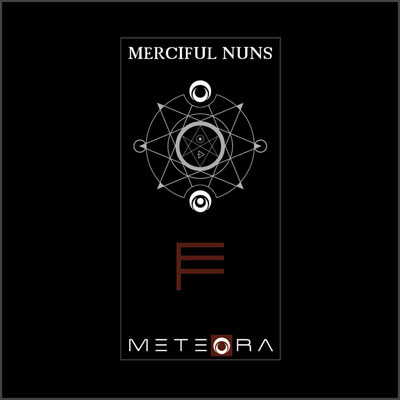You can support Terra Relicta by donating! Please, do so, and thank you!
 Band: Merciful Nuns
Band: Merciful Nuns
Album title: Meteora VII
Release date: 12 September 2014
Label: Solar Lodge
Tracklist:
01. Elektra
02. Phantom Wall
03. Karma Inn
04. A Day That Fades II
05. Speed Of Light
06. Eulusian Ground
07. Zero G
08. A Place Beyond
For Pythagoras, seven was a cosmic number: the sum of three (perfect triangle, divinity) and four (harmonious square, earthly elements), a bridge between heaven and earth. Meteora is precisely number seven on the Merciful Nuns' list of full-length albums and, furthermore, it's lyrically located "at the event horizon between this world and the beyond" - in Artaud's own words. Still in the astral spell of the predecessor, Exosphere VI, we now embark on a no less fascinating musical voyage across ancient mythology and towards transformation. So much so that you will raise the eyes skyward (and beyond) more than once, impelled by the flawless sound design of Meteora VII in seeking responses to those timeless questions that arise for humans since they are what they are. Such is the force of suggestion that Merciful Nuns' music possesses. The journey ends in Meteora itself, a womb-like location where body and soul transcend into god-like entities: "... / feel the ancient cold / in a place beyond / I am god / I am none". It takes its name from the imposing Greek rock whose monasteries "appear to be floating" at dawn in the fog - as Seth himself tells it. So there is no better metaphor for the elevation addressed in Meteora VII and, moreover, our subsequent contemplation of it.
That is particularly noticeable in the magnificent closing track. "A Place Beyond" induces a truly dark and surreal atmosphere in such an artful way that, although we ascend further and further as the song moves forward, we find ourselves arriving to plausible territory. Even for moments the track feels as autonomous, expanding and contracting as if it were alive. Drums impose a shamanic pace, paired with Jawa's resonant pinches on bass. The noisy background conveys an image of giant stones slowly sliding, which combined with the sacred, deep as oboes chants and the mystery-filled layers of cymbals, lead us to a mystic realm whose remoteness can be felt with ease. Fleetingly, Jón Tmoh plays his way up the neck of guitar from afar, adding even more bleakness to the already wintry ambiance, while Artaud's soaring voice makes us sharers in the beauty of transformation. Sounding in equal parts eerie and peaceful, it's just the kind of song that sets Merciful Nuns apart. The same holds true for "A Day That Fades II" - originally pressed upon the B-side of the 7" single Earth which, in turn, was included in Exoplanet EP. Again, the emphasized, chilling bass lines serve as the track's conducting wire, plugged to the dreadful vocal delivery to foster a climate of anguish and uncertainty. Though a cadenced string melody joins rattles and synths to release the tension over the last third. Gradually, an intense floating sensation is provided while serenity takes root in the grim vacuum. Despite, or because of, its apparent simplicity of forms, these two songs have the overwhelming strength of something created from a sincere expressionist need.
Another key issue in Meteora VII is its linkage with Artaud's first musical incarnation, Garden Of Delight, in particular with their influential album Necromanteion IV. One can immediately perceive this connection when the first song is launched off. Both records hold in common the lyrical references to the Greek mythology - in this case Elektra, Triton, Hades, Cyclops, the Eleusinian Mysteries and the Morphic Fields - besides the faithful manner in which music reflects that occult, ancestral imagery on the basis of an anthemic strings driving (with primary role to bass), a deep pounding of drum thuds and, above all, the epic chilled, faraway-in-time (and space) vibe triggers which are strategically located in the excellent vocals of Seth, as well as being synthed into the backdrop. "Elektra", "Karma Inn" or "Speed Of Light" may well endorsed that statement, while "Eulusian Ground" and "Zero G" teach us a lesson about hymn-otic Goth Rock: chest-thumping drums, displaying all their primitive force; neurological, rumbling bass thrums; distant-sounding wails of guitar, carrying immemorial traces with them; and the undisputable drawing power of a singer who is able to approach us the intangible with surprising immediacy. For its part, "Phantom Wall" reveals a lesser known side of Merciful Nuns: built on a deliberately old-fashioned rock'n'roll rhythm, its visceral turbulence is the perfect embodiment for the lyrics: "... / watch their bodies, watch them fall / watch her faceless, breathless call / hear those anthems, hear them crawl / watch those phantoms all, all, all, all, all / on a phantom wall...".
What you are ultimately left with is Goth Rock in capital letters, a visa-free travel to weirdly idyllic dimensions, directly derived from a band that channels its efforts in the hope of better understand the musical language itself.
Review written by: Billyphobia
Rating: 9,5/10